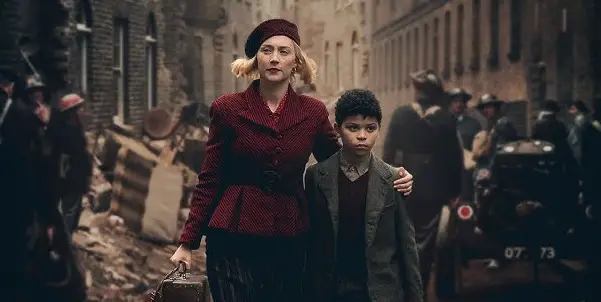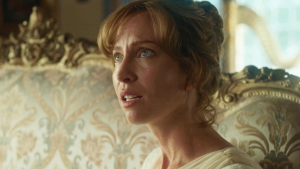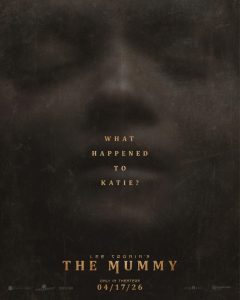
Understanding our home is crucial to understanding ourselves. In Blitz, which premiered at the BFI London Film Festival, writer and director Steve McQueen presents two different versions of home – the “small” of the family and the “big” of the country – as two warring aspects of identity that 9-year-old George (Elliot Heffernan) has to wrestle with during the larger conflict of World War II. Though the tautness of the drama slacks in its final third, Blitz is a thoughtful, sometimes thrilling and often very loud story of home and identity during the London Blitz.
As Blitzkrieg bombs reign down on London, George, his mum Rita (Saoirse Ronan) and Grandad (Paul Weller) huddle for safety in Stepney Green Underground station. Rita is reluctant to evacuate George to the countryside because, though he may be safe from bombs, he won’t have someone to protect him from the racist bullying he receives as the son of a Black father and white mother. When she finally makes the decision, a defiant George absconds before the train reaches its destination, and he begins a journey back to Rita, who begins her own journey to find him.
The Sound Of Warfare
If Blitz’s written prologue-cum-title card doesn’t situate you in time and place strongly enough, the opening few minutes will. Streets of London are ablaze. Volunteer firefighters frantically try to extinguish the flames. A hose spirals out of control from the strong water pressure. It leaps and dances in the air like a python convulsing under electric shocks. The image is powerful, but sound is more powerful still. It is loud. So loud that the lady next to me actually put her fingers in her ears. This kineticism, established and led by the sound, propels the film on – until it begins to flag in its final third.
source: Apple TV+
Sound is massive throughout Blitz – both in decibels and significance. Bombs whistle down to earth through dark clouds. Luftwaffe planes hiss overhead in the night sky. Fires crackle and trains screech on their tracks. But singing also soothes. Grandad’s piano mends upsets and tightens the family bond.
And Hans Zimmer’s score, though for the most part typically Zimmerian, is at its most interesting when it reminds us how war normalizes the industrialization of death. Over images of “Rita” the Riveters working away on heavy machinery, malevolent strings glaringly remind us that, despite “Whistle While We Work” cheerily sounding from the factory tannoy, these well-coiffed ladies are busy using manicured hands to create weapons of war.
Home And Identity
The two versions of homes McQueen presents, family and country, are both at stake in Blitz. If George doesn’t grasp what’s at stake for the bigger “home” of the country, he certainly grasps the peril of losing his family home as an evacuee. At home, “Gorgeous George” knows who he is. He plays the piano with Grandad and sings with Mum. He feels safe. But just beyond that boundary, just out on his street, racist taunts are always on people’s lips, ready to be deployed. In the larger home of the country, he isn’t sure who he is.
The script spells this out, perhaps a little clumsily, with characters repeatedly asking George his name – to which George repeatedly struggles or delays answering. But Blitz is at its best when it explores this conflict of identity.
source: Apple TV+
As racist caricatures of Black faces stare back at George from the windows of the Empire Arcade, McQueen cuts from one close-up to another, from caricature to reality, as Ife (Benjamin Clementine), an air raid warden from Nigeria, suddenly stands alongside him. It’s the first time George has seen a Black person outside of racist tropes. Ife is, simply, a good guy. When McQueen’s script threatens to make Ife’s character a different form of caricature through a public display of near-implausible courage and eloquence, George’s response to seeing Ife’s courage – a simple, positive declaration of his own identity for the first time – doesn’t only extinguish the threat, but creates the film’s most moving moment.
As George makes his way closer to home, the film loses the momentum it established in its opening. It falls into an episodic structure, as though McQueen couldn’t resist adding in some of the interesting stories he fell upon during research. Even when the characters of these sections are played by actors as excellent as Stephen Graham (as a pseudo-Fagin) and Kathy Burke (genuinely ghoulish), the verve they inject isn’t enough to match the life of the film’s earlier sections.
Reunions
This slowing slides into the final act and the anticipated final emotional beats. But perhaps this subduing is what McQueen’s aiming for by toying with our expectations of reunions. We imagine them to be a return to something or someone we once knew – just as we remember them.
source: Apple TV+
But a true reunion is a mirage. We change, and our homes change, so that when we return, we’re not returning as the same person to the same thing, whether that’s your mum or your home. As individuals, like countries, we’re always changing, yet somehow staying the same.
As Orwell said, “What can the England of 1940 have in common with the England of 1840? But then, what have you in common with the child of five whose photograph your mother keeps on the mantelpiece? Nothing, except that you happen to be the same person.”
Conclusion
For the most part, this is a WWII film from Steve McQueen as you might imagine it. As in all his work, McQueen coaxes strong performances from his actors, with particular props to first-timers (at very different ages) Heffernan and Weller. But if you expect a quiet, thoughtful war film, you’ve only got it half right. Blitz’s sound assaults the senses while tugging at your heartstrings, through a mostly successful script and an interesting exploration of home and identity.
Blitz had its world premiere at the BFI London Film Festival 2024. It will released in cinemas on Nov. 1 and on Apple TV+ on Nov. 22.
Does content like this matter to you?
Become a Member and support film journalism. Unlock access to all of Film Inquiry`s great articles. Join a community of like-minded readers who are passionate about cinema – get access to our private members Network, give back to independent filmmakers, and more.











